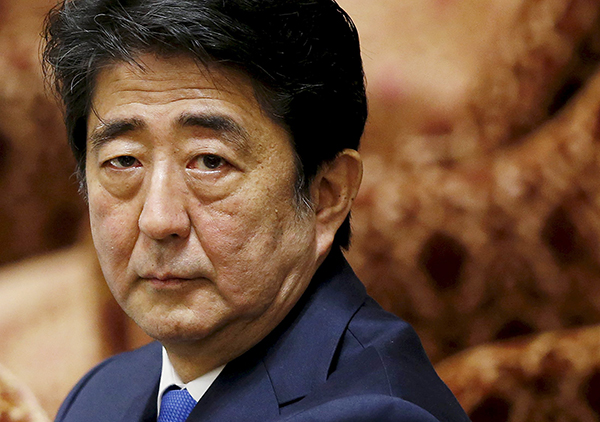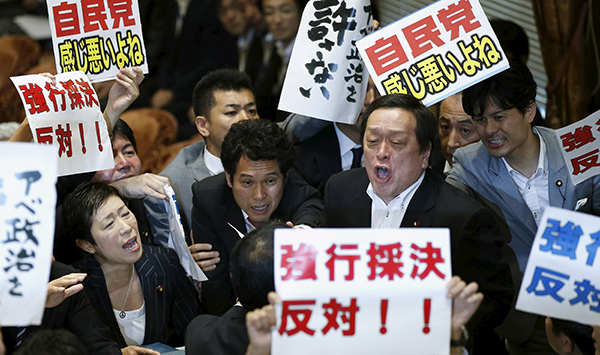 |
|
Japan's Prime Minister Shinzo Abe attends a lower house special committee session on security-related legislation at the parliament in Tokyo July 15, 2015. A series of controversial security- related bills were passed in a Japanese parliament's lower house special committee in spite of strong opposition from both home and abroad. [Photo/Agencies] |
A series of controversial security- related bills proposed by Japan's ruling bloc were rammed through a special committee of Japanese parliament's lower house Wednesday noon, paving the way for a vote for the bills at the full chamber later.
Opposition lawmakers in the panel held banners reading"no allow to Abe's politics"and tried to disturb the passage of the bills, which are considered widely as unconstitutional.
The ruling camp, which groups Prime Minister Shinzo Abe's Liberal Democratic Party and its small partner of the Komeito Party, is reportedly to vote on the bills in the all-powerful lower house on Thursday.
The ruling camp maintains two thirds of seats in the lower house in the Japanese bicameral Diet. According to Japanese law, if a bill was passed in the lower house but was vetoed by the upper house, the bill could still be enacted after securing over two thirds of votes in a new poll in the lower house.
Recent polls by Japanese media showed that the majority of Japanese population are against the security legislation and about 90 percent of Japanese constitutional experts see the bills unconstitutional.
The bills, if are enacted, will allow the Japanese Self-Defense Forces (SDF) to play a greater role by engaging in armed conflicts overseas and help defend others even if Japan is not attacked, or exercising the right to collective self-defense.
But the Japanese pacifist Constitution, especially the war- renouncing Article 9, clearly bans the SDF from combating aboard and using the collective defense right. Abe's administration unconstitutionally reinterpreted the Constitution so as to lift the restriction.
About 1,000 Japanese protested outside the parliament building in downtown Tokyo when the panel passed the bills. Enditem
A series of polls released recently by major Japanese media showed that the majority of the Japanese population were against the security legislation, with separate polls carried out by the Nikkei Daily, Mainichi Shimbun, NHK and Asahi Shimbun showing that at least 55 percent of those surveyed showed their opposition, while only 30 percent supported the bills.?
 |
|
Yasukazu Hamada (2nd R), chairman of the Upper House Special Committee on Security, shouts as he is surrounded by opposition lawmakers during a vote on the security-related legislation at the parliament in Tokyo July 15, 2015. [Photo/Agencies] |
The poll taken by the center-right Yomiuri Shimbun also showed that about 50 percent were against the bills and only the survey conducted by the right-wing Sankei Shimbun showed that supporters of the bills surpassed the opponents with a reading of 49 percent to 43.8 percent.
Among a total of 326 opinion papers filed to the lower house affairs bureau by 297 local assemblies in 39 out of 47 prefectures as of Friday, 292 of the local assemblies oppose or maintain cautious attitude toward the legislation, with only five local assemblies showing their support for the bills.
Those who oppose the security bills consider, on one hand, that the legislation violates Japan's pacifist Constitution, especially the war-renouncing Article 9. The Japanese supreme law bans the SDF from exercising the right to collective defense and engaging in conflicts abroad.
The country's constitutional scholars, including veterans fighting for revising the Constitution, said that Abe's trying to ram the bills through parliament will jeopardize the rule of law and diminish the role of the constitution to limit political power.
"If Abe's administration forces this policy through parliament without amending the constitution, that would be the beginning of tyranny and the destruction of the rule of law,"Setsu Kobayashi, professor emeritus at Keio University, said in a recent press conference.